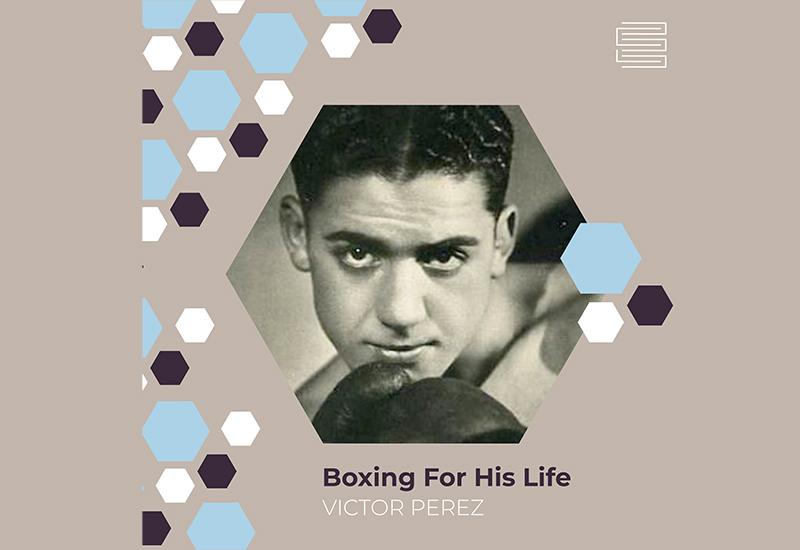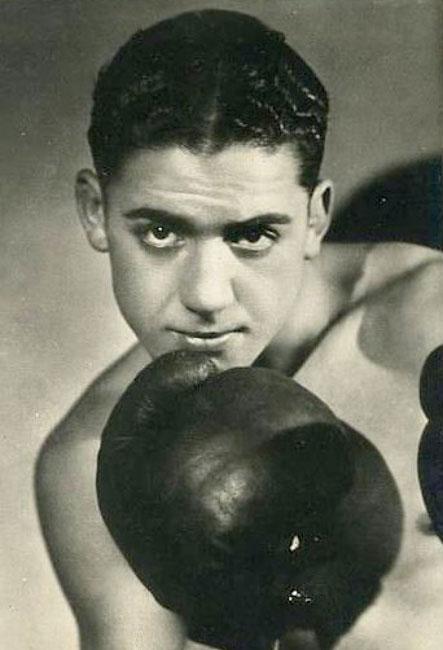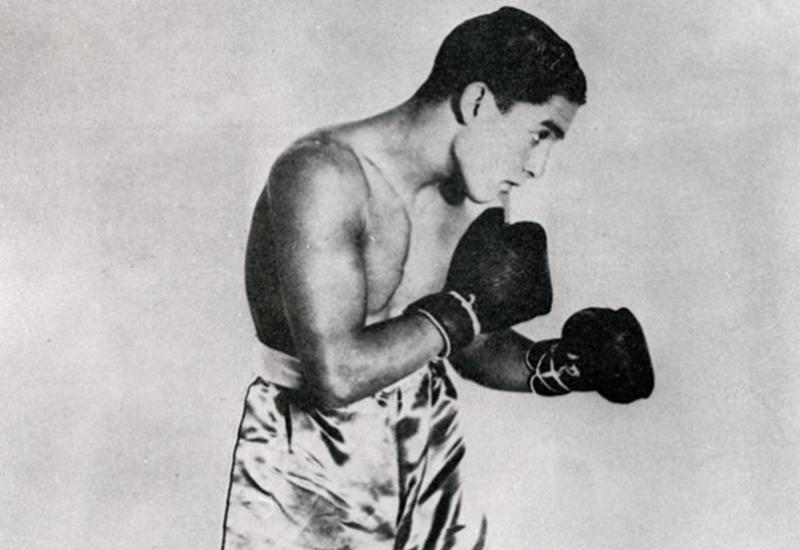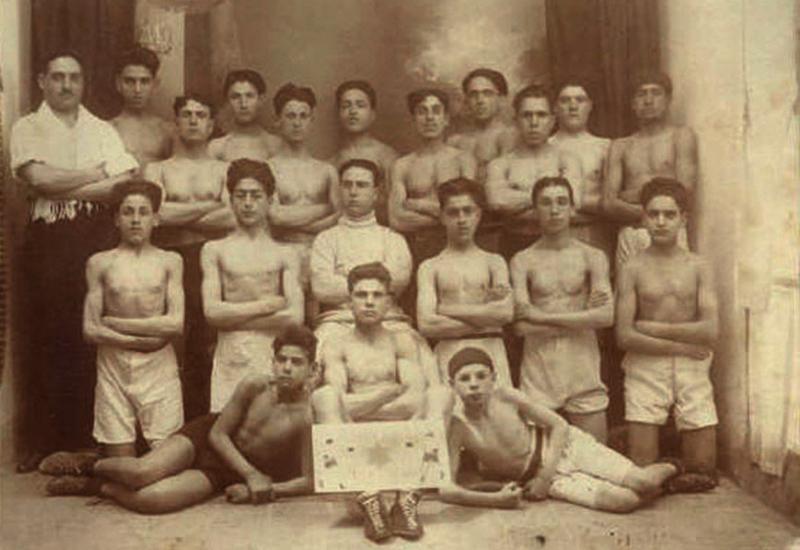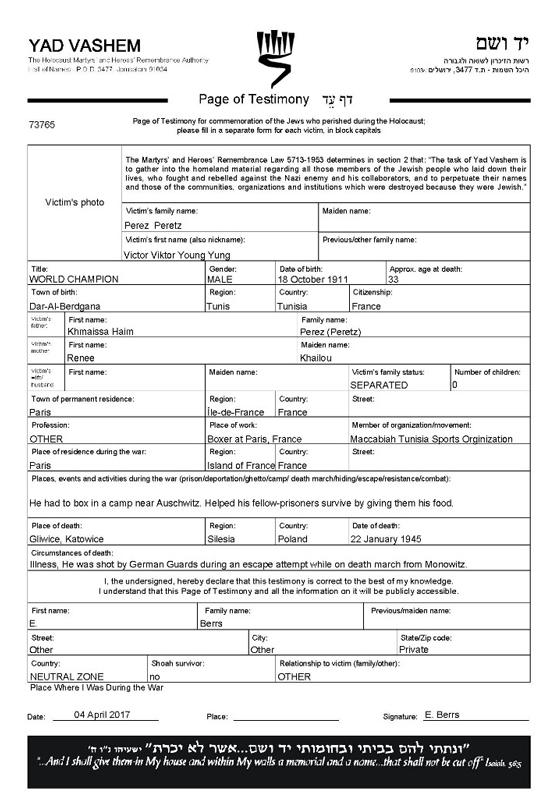Victor "Young" Perez was a talented and celebrated Jewish boxer from North Africa. With the German occupation, Victor’s fame could not prevent his arrest or deportation. Was his fighting spirit enough to help him survive?
Student Reflection Handout
Transcript Boxing For His Life Victor Young Perez
Hello and welcome to "The Human Spirit in the Holocaust", an Echoes & Reflections podcast, in which we shine a light on remarkable stories of courage, perseverance and hope during one of the darkest periods in human history. Echoes & Reflections is a partnership of the ADL, USC Shoah Foundation and Yad Vashem, the World Holocaust Remembrance Center in Jerusalem. Our podcast is produced by Yad Vashem.
I'm your host, Sheryl Ochayon.
[ANNOUNCER]
"Ladies and Gentlemen! Welcome to the Palace of Sports in Paris, France where 16,000 wildly excited fans are ready for the main event of the evening tonight, October 24th 1931! This match is for the World Flyweight crown!
In this corner, weighing in at 115 pounds, the holder of the OLYMPIC GOLD MEDAL, and the current world Champion, the American fighter from New York, Mr. 'Frankie' Genaro! And in this corner, weighing in at 114 pounds, with a professional record of 32 wins, 12 knockouts and only 1 loss, the French flyweight champion from Tunis, Tunisia, Mr. Victor 'Young' Perez!!
The first round of the match goes to Genaro. But here in the second round Young isn’t even giving Genaro time to warm up. Young lands a crushing right hook to the chin, knocking Genaro to the canvas! The ref is counting! 1, 2, 3, 4, 5, … Genaro can’t manage to stand up. It’s all over! Ten seconds into round two, Young Perez wins in a brilliant match! This kid was born with boxing in his blood! He is the youngest world champion in boxing history!"
You may be asking yourself, “What does this boxing match have to do with the Holocaust?” If you are, I’ll tell you.
You’ve just heard a simulation of Victor “Young” Perez winning the World Flyweight Boxing Championship. He was the youngest to EVER win this championship - but during the Holocaust, the Nazis didn’t care about his title, his glory or his crown. Young Perez was a Jew, and as a Jew, he was targeted to be killed.
Let me tell you his amazing story. Not only did this man never give up, he used his position to help his friends whenever he could, even if it meant taking a huge risk.
Victor was born into a poor family in Tunisia in North Africa, on October 18, 1911. The Jewish community was a tiny minority in a place where 99% of the population was Muslim.
From an early age Victor had dreamed of becoming a famous boxer. The Jews of Tunis weren’t allowed to join local sports associations. So, they organized their own, called “Maccabi”. Victor’s older brother Benjamin was a boxer who trained there. He became the flyweight boxing champion of North Africa. Victor tagged along, watched his brother and learned. He had natural talent and was quick on his feet. When he was 14 he turned pro and adopted the nickname “Young.” From then on in the boxing world he was known as Victor “Young” Perez.
He also insisted that his boxing shorts be emblazoned with a Star of David. He proudly wore this symbol of his Jewish identity.
Physically, Young was small and thin. He reached a height of only 5’1” and weighed around 110 pounds. He was not a power hitter, but he was a non-stop puncher. He won all the fights he fought in North Africa and then decided to try his luck in France. So, one day, when he was just shy of 17, he left his mother a note, went down to the port and caught a ship from Tunis to Marseilles. He had no ticket and not a penny in his pockets, but with his raw nerve and determination alone, he managed to get to Paris. This was the step that changed his life.
In Paris, Young spent hours in the gym, training. At nineteen years old he became the French Flyweight Champion. Then, right after he turned twenty in 1931, he fought the American boxer Frankie Genaro for the world title, the fight you just heard. Victor returned home to a hero's welcome: 100,000 cheering fans, Jews and Muslims, lined the main street of Tunis to see him.
Victor “Young” Perez, the poor boy from the Jewish quarter of Tunis, was World Champion! Young had become an international superstar! Children collected caramel candies with his photograph inside!
When World War II broke out on September 1, 1939, Young was living in Paris. In May of 1940, the German army invaded France. Persecution of the Jews began immediately. Laws were passed isolating Jews from French society and taking away their livelihoods. Beginning in the winter of 1940, thousands of Jews in France were arrested and imprisoned in internment camps. In 1942 Jews were forced to wear a yellow star.
Unlike the star of David he had proudly worn on his boxing shorts, this star marked Young as a target. He refused to wear it and someone informed on him.
Young was arrested by French police collaborating with the Germans on September 21, 1943 and taken to Drancy, a transit camp near Paris. From there he was crowded into a train, destination unknown.
Fred Knoller, a Jewish man who had fled from Austria and was arrested in Paris, was on that same train.
[FRED KNOLLER]:
"There were 1000 people on that transport – Transport #60. In each wagon was 100 people squeezed in. And when there seemed to be no more room, the SS with whips squeezed us in, in order to make space for the remainder. There were two water buckets and one sanitary bucket in each wagon. [SIGH] And they closed the wagons. We went on this train for 3 days and for 3 nights. I don't know whether you can imagine the stench from the overflowed sanitary bucket. The moaning. The crying of the children. The fights between each other for more room. It was really one of the worst things that I experienced…and, um, it was an ordeal, an ordeal that we experienced which I will never, ever forget…. You become a subhuman to a certain extent."
After three days the train arrived, early on a freezing, rainy October morning, at Auschwitz. Auschwitz was the largest of all the Nazi extermination and concentration camps, and was located in southern Poland. Jews were brought there from all over Europe. What happened to the Jews who arrived is described by Ellis Lewin:
[Ellis Lewin]
“When we arrived to Auschwitz the minute they opened the wagons it was just total, complete misery - beatings and screamings and beatings and barking of dogs and growling of dogs and, and whistles of trains and screaming and beating and screaming and commands given. It was just, it was just like you open the doors and all of a sudden you find yourself in this inferno, in this, in this unimaginable… horror that you, as an adult or a child, you would see in nightmares. And it was just coming through.”
In this atmosphere, Jews were forced off the train and made to stand in line while German doctors selected those who would be killed immediately, and separated out those who would be exploited for forced labor. Most - some 1 million Jews - were murdered at Auschwitz in four huge gas chambers. Of the 1000 Jews in Young and Fred's transport, over 700, almost three out of four, were never seen again.
Young was selected for forced labor together with the remaining 1/4 of the Jews on the train. Like the other prisoners, he was stripped naked and shaved. His arm was tattooed with the number 157178. This humiliating process was intended to dehumanize the prisoners. Most were then sent to perform backbreaking slave labor. Prisoners lived, at most, a few months.
Although Young hadn’t boxed in five years, he was recognized as a former world champion. He was forced to box in weekly boxing matches.
Does it seem strange to you that behind the barbed wire of Auschwitz, in this place of beatings and death, there was a boxing ring and matches between prisoners who were ordered to fight? The SS set up these boxing matches for their amusement.
Paul Steinberg, another Auschwitz prisoner, witnessed Young's first fight.
[PAUL]:
"And now, shut your eyes. Try to imagine the following scene. Roll-call square, as big as two football fields; in the middle, the ring, illuminated by antiaircraft searchlights. On three sides, the electrified barbed-wire fence, 13 feet high. Watchtowers every fifty-five yards, each one with a machine gun.
In front of the ring, two hundred SS men of all ranks.
On the opposite side, a hundred and fifty senior block inmates, murderers of every sort. Lording it over them, the senior camp inmate, over six feet tall and weighing 220 pounds, he had a habit of killing inmates as though he were swatting flies.
Young Perez climbed into the ring.
Our monstrous audience had come to claim its ration of blood and violence. There was a stir in the opposite corner and our opponent stepped over the ropes. My jaw dropped. A beefy middleweight, around 165 pounds, just under 6 feet tall. I later found out he was a soldier from the Wehrmacht who'd had a few fights as an amateur.
The referee, a big blond SS man, called the fighters to the middle of the ring. Then the bell rang."
Young was exploited by the Germans and forced to fight many matches like this against other prisoners twice every week for their entertainment. Some say he fought as many as 140 matches during his 15 months as a prisoner. Often he was forced to fight boxers who were much taller and heavier than he was. But Young did not let them defeat him – he won every match but one.
Young did not let the Germans defeat his spirit, either. He was assigned to work in the camp kitchen which was lucky because, with his fighting spirit and desire to help others, he exploited his position there to assist his friends in the camp. Every night after roll call he risked his life to steal a 50-liter barrel of soup and distribute it in secret from the side door of the kitchen so that his friends would have extra rations to keep them alive. Noah Klieger, another former Auschwitz prisoner forced to box, fully believes this soup saved his life.
Young's friends warned him that he was taking a huge risk – he could be hung for sabotage. But time and again, Young answered them, “That doesn’t matter. A man doesn’t live for himself – he lives to help others.”
In January 1945, with the Soviet army rapidly advancing, the Nazis abandoned Auschwitz, forcing approximately 57,000 prisoners to march west, towards Germany, in bitter cold, with little or no food, water or rest. Young was among them. These marches were called "death marches". Thousands died along the way. Those who were unable to continue were shot. Fred Knoller was there:
[FRED]:
"We continued walking and walking. I believe we walked somewhere around 80 km. It was freezing cold. We went on a road, trees and woods on either side. Nothing to eat, absolutely nothing to eat. We picked up snow and put the snow into our mouths to get some liquid. People collapsed."
On the third night, the exhausted prisoners rested briefly at an abandoned camp. At dawn Young was missing... Suddenly his friends saw him coming towards them, a huge grin on his face and a sack on his back, shouting, "I found bread for everyone!" But before he could share the food with his friends he was shot by an SS guard. His friends were forced to march, leaving Young, the former champion and their champion, behind - lying in the snow.
The soup Young stubbornly supplied, risking his own life, helped many prisoners – we will never know how many – stay alive in the face of starvation. One of them traveled halfway around the world years after the war to find Young's brother Benjamin in Tunis, just to tell him that he owed Young his life. Ultimately, Young gave his own life trying to find bread on the death march to save his friends, though he didn't have to.
Victor Young Perez was way more than just a champion fighter in the ring. As Noah Klieger has said, “He was small of stature in the boxing ring, but he was a great man, noble of human spirit.”
Eighty years later, Victor's story continues to inspire us.
***
Thanks for listening. For more podcasts about the Human Spirit in the Holocaust, please visit the Echoes & Reflections website, at echoesandreflections.org. Thanks to Moshe Cohen, as the voice of Paul Steinberg from his memoir, Speak You Also. To learn more about the stories of Fred Knoller and Ellis Lewin, you can find their complete testimonies at USC Shoah Foundation. Special thanks to Sarah Levy.




